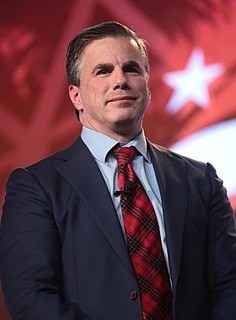A Quote by Tom Fitton
It's a very insular political community up there. I think the court's part of that and they're protecting their own. There's no justice in Vermont today.
Related Quotes
When I was a prosecutor in Kansas City, my job was to fight for justice and safety for all citizens in my community. Equal access to justice under the law is an American value embedded in the fabric of our legal and political system - the idea that anybody, powerful or not, can have their day in court.
We often imagine that the court serves as a sort of neutral umpire controlling the warring political branches. But this is mostly myth. The justices of the Supreme Court are themselves actors in the struggle for power, and when they intervene, they think carefully about how their decisions will affect the court's own legitimacy and authority.
Vermont is such a small state, and the most money that's ever been spent in the history of political campaigns there is $2 million. That number is going to be surpassed many times. Vermont remains a "cheap state" for the Republican National Committee. So putting $5 or $10 million into Vermont - compared to New York or California or Illinois - that's small potatoes.
Years ago, I was asked to come up to do a store signing in Vermont. The short version is the two younger guys who own the store pick me up at the airport and start driving me around Vermont, showing me the sights and the textile mills and the restaurants, and the punchline is there's no store. There is no store!
A chief justice's authority is really quite limited, and the dynamic among all the justices is going to affect whether he can accomplish much or not. There is this convention of referring to the Taney Court, the Marshall Court, the Fuller Court, but a chief justice has the same vote that everyone else has.
We never really see the global situation as a total situation. Today's political leaders are still lacking of the vision. They very often just try to cope with their own election, their own popularity, solving the problem or selling the ideas to meet their own voters. By doing that, it creates a great imbalance in terms of making deals or treaty or all those things. Even today the borders they're seeing the physical borders are very different from the political borders. Because all those powers are so connected, and you cannot even see whose interest in what move.
One of the facets of growing up the way I did, I never had the experience of being solely in the black community. Even my family, my mother is what they call Creole, so she's part French, part black, and grew up in Louisiana. It's a very specific kind of blackness that is different than what is traditionally thought of as the black community and black culture. So, I never felt a part of whatever that was.
We often imagine that the court serves as a sort of neutral umpire controlling the warring political branches. But this is mostly myth. The justices of the Supreme Court are themselves actors in the struggle for power, and when they intervene, they think carefully about how their decisions will affect the courts own legitimacy and authority.





































